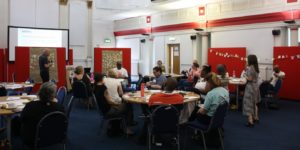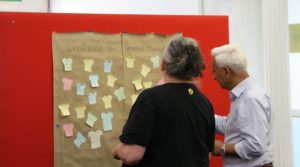Failure is an inevitable aspect of human experience, but in a social environment that demands success, it tends to be swept under the carpet and forgotten, along with the opportunity to learn from our mistakes. Is it possible to create a space where we can openly share stories of our failures and what we have learned from them?
The workshop “Learning from Failure – Airing our Dirty Laundry”, organised by six members of the GMCVO-hosted Greater Manchester Third Sector Research Network[1] and funded by the Voluntary Sector Studies Network (VSSN), aimed at creating exactly such a space – a protective, trustful and safe environment where experiences and knowledge about learning from failure could be exchanged. We wanted to avoid shaming, blaming and re-experiencing negative emotions from the past and add a playful twist to it. The latter was reflected in the decoration of the venue. Laundry lines with tiny wooden pegs stretched across the room. Participants jotted down their notes and ideas during the different activities of the workshop on little t-shirt-shaped sticky notes that came in many different colours and were hung on the lines. Thus decorated it felt natural and safe to air one’s dirty laundry!
The day was divided into different activities. These addressed various aspects of the topic, required different levels of attention and activity, and appealed to different senses in the audience.
At the beginning of the day, six volunteer speakers from diverse professional and ethnic backgrounds presented personal 5-minute stories about failure when working in the voluntary, community and social enterprise (VSCE) sector. The stories were so captivating you could have heard a pin drop. The stories were very straightforward and inspiring. One of the speakers even decided to adapt their story to be more candid than planned, and all around the room, lively conversations about failure followed. The participants were asked to note their ideas and impressions about the talks on the little t-shirts and hang them on the lines — which was fun and a little bit silly and lightened everyone’s mood.
A panel workshop followed with four experts. Two presented learning from failure from a theoretical perspective, and the other two from the funders’ point of view. The former provided a framing of the topic of the day in regards to the definition of failure and solutions offered by research. The latter discussed – in different ways – how funders would wish to be involved and consulted when a funded project is taking an unforeseen direction. The Q&A session that followed was very lively. The group discussed the different qualities and degrees of failure, the differentiation of well-intentioned failure and dishonesty from the point of view of the funders, trust and responsibility, shaming and blaming. We have to consider that the impacts of failure can be devastating and as such, learning from failure needs to be taken seriously if we are to avoid future harm. After lunch, John Hannen, CEO of GMCVO, gave practical examples of how his organisation dealt with the phenomenon of failure in the Ambition for Aging programme through a test and learn approach and noted that learning from failure requires resources and capacity. This included the challenge of encouraging openness about failures in a competitive funding context, and the differential impact of failure on organisations and communities, in which those with fewest resources can least afford to fail.
To conclude the day and to help participants digest what they learned and discussed, attendees were asked to interview each other. They were then asked to jot their thoughts about what they learned and how they were going to apply that knowledge on some more of the little t-shirts. In this way everyone was nudged to think more deeply about what had been debated and what that could mean for oneself.
Through the day, passive and active elements alternated and time went by very quickly. Attendance was good, despite the rail strike, and people participated equally in thought-provoking conversations, which prompted valuable reflective learning from our failures.
Most importantly, the workshop achieved what it set out to do and created an atmosphere that encouraged free discussion about one of the most difficult aspects of VCSE work. The natural next step might be to continue with another event, this time focussing on putting the learning from failure into practice.
For more information about the Greater Manchester Third Sector Studies Network, please visit: https://www.gmcvo.org.uk/Greater-Manchester-Third-Sector-Research-Network
For more information about the event and for a more detailed version of this blog, please go to: https://www.gmcvo.org.uk/news/airing-our-dirty-laundry-creating-open-and-supportive-atmosphere-reflecting-failure
[1] Simon Armour, Manchester Metropolitan University; Melvin Bradley, Mental Health Independent Support; Katja Levy, Manchester China Institute; Susanne Martikke, GMCVO;
Lucy North, GMCVO; Alexander Tan, AT Research; Hayley Trowbridge, People’s Voice Media



